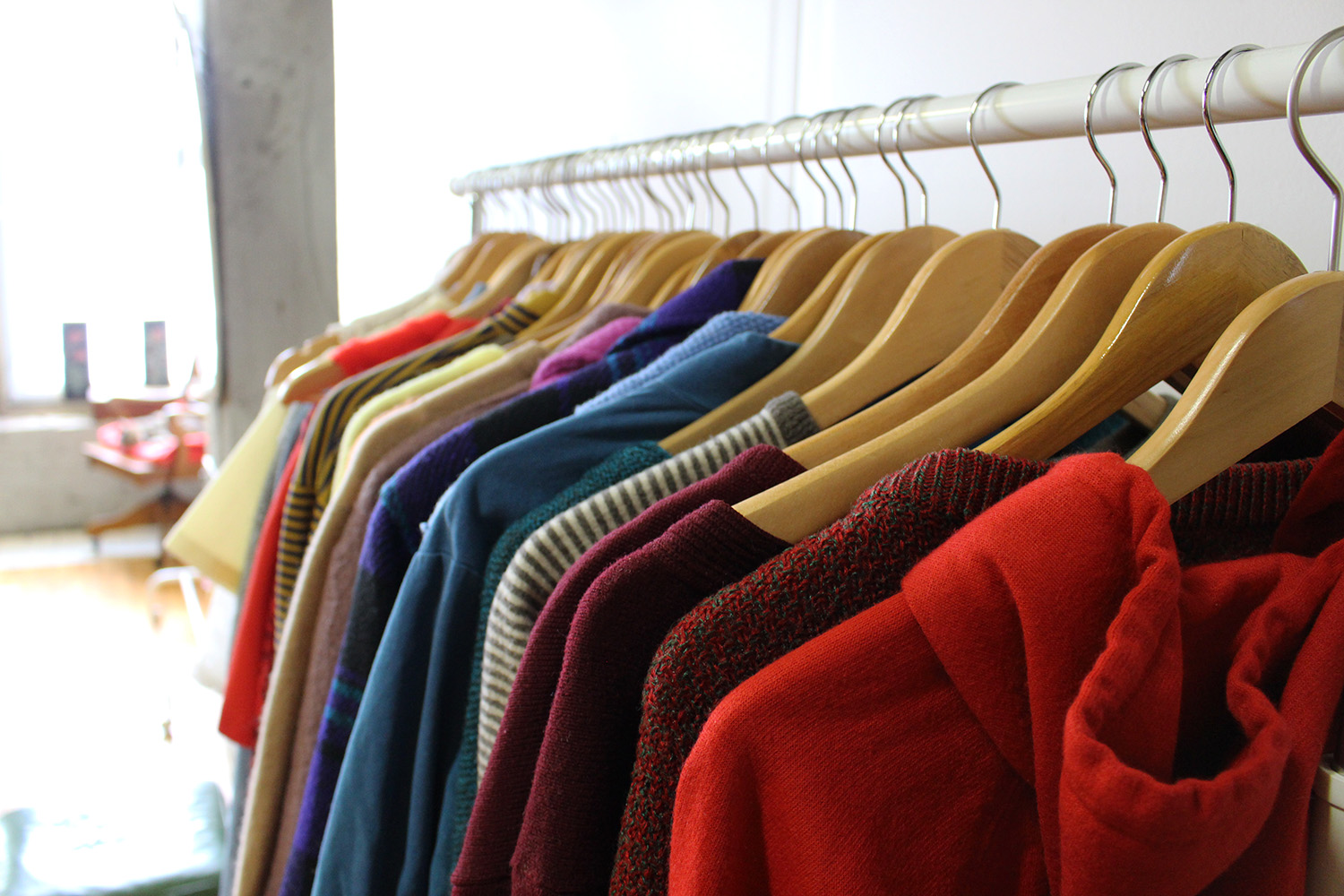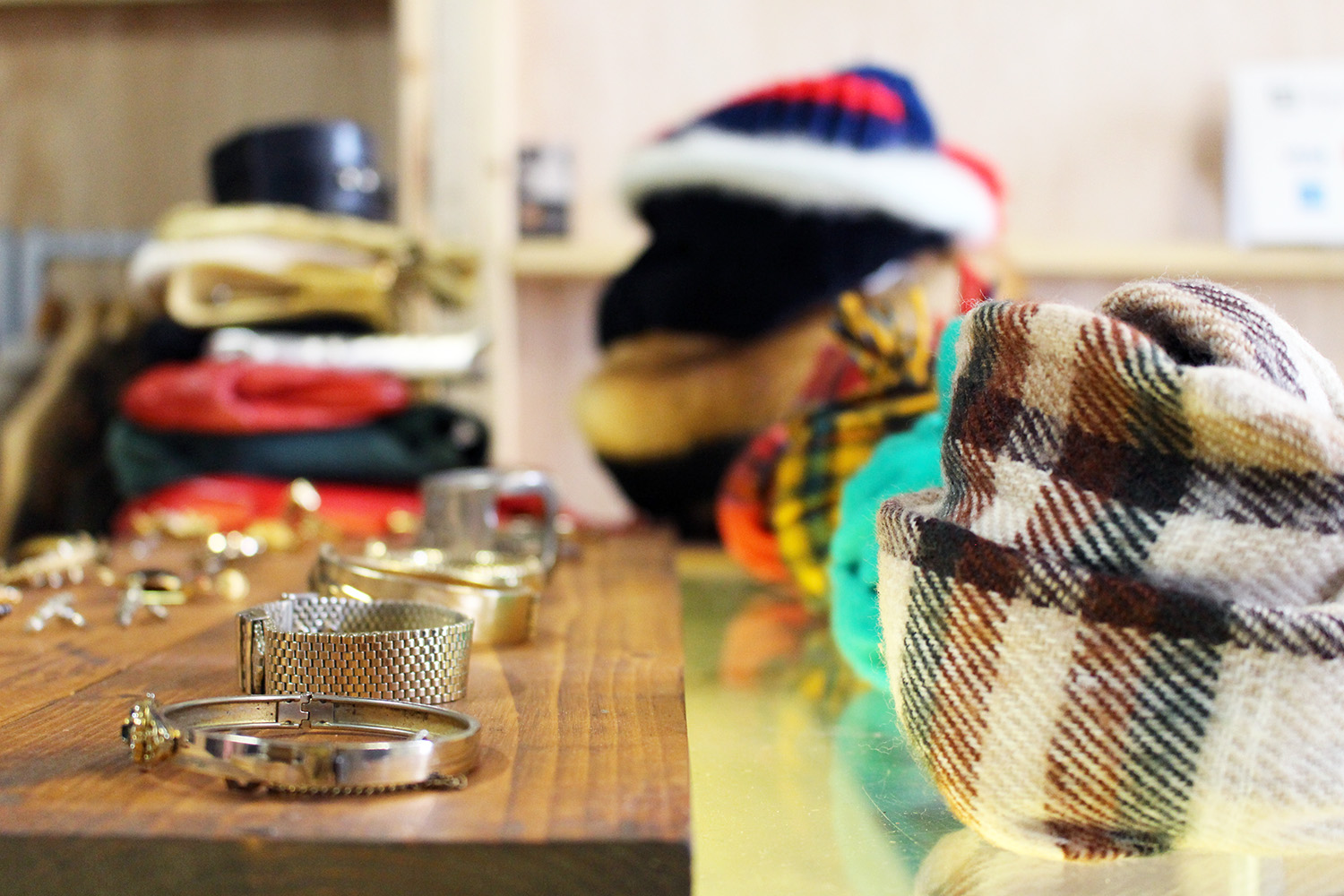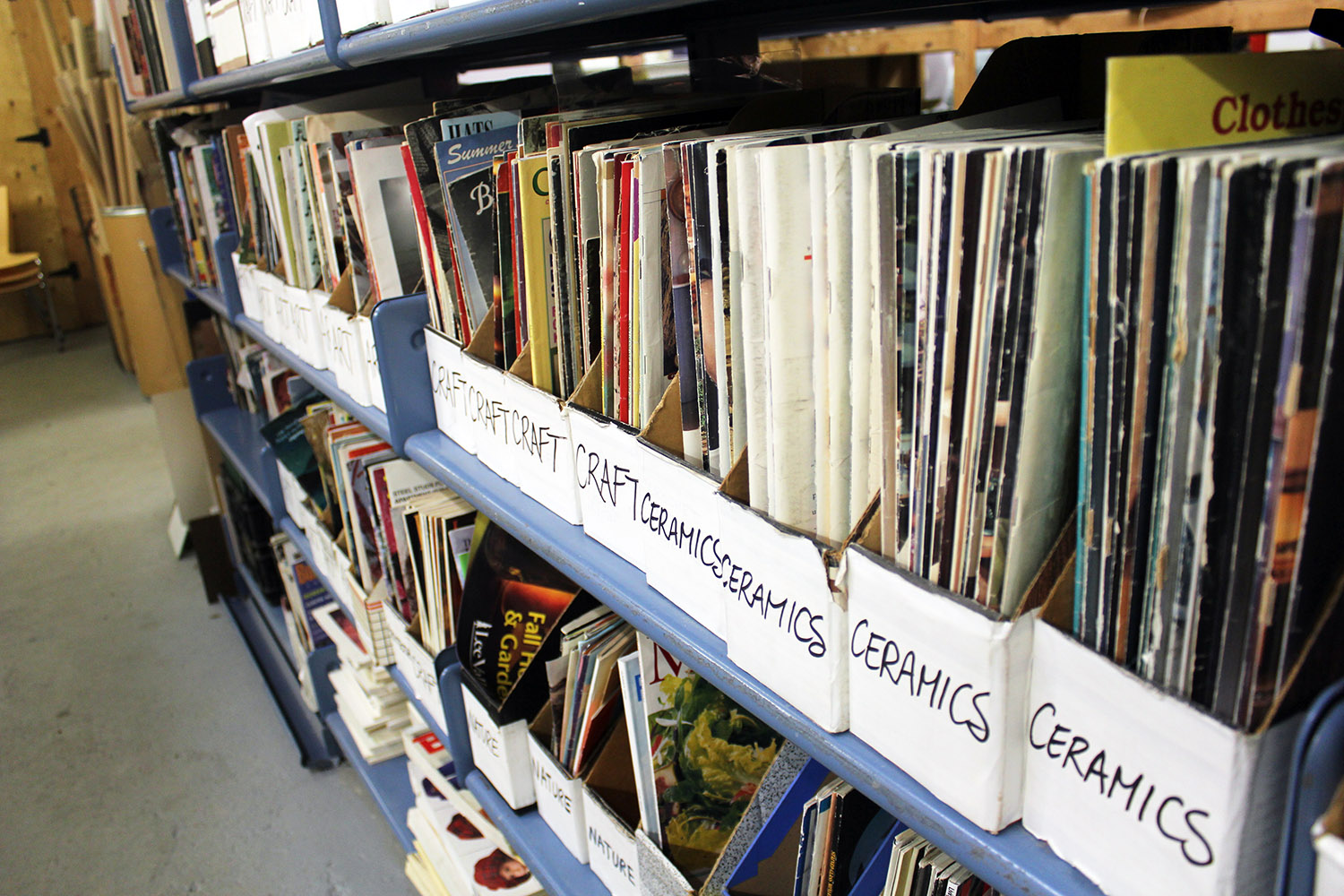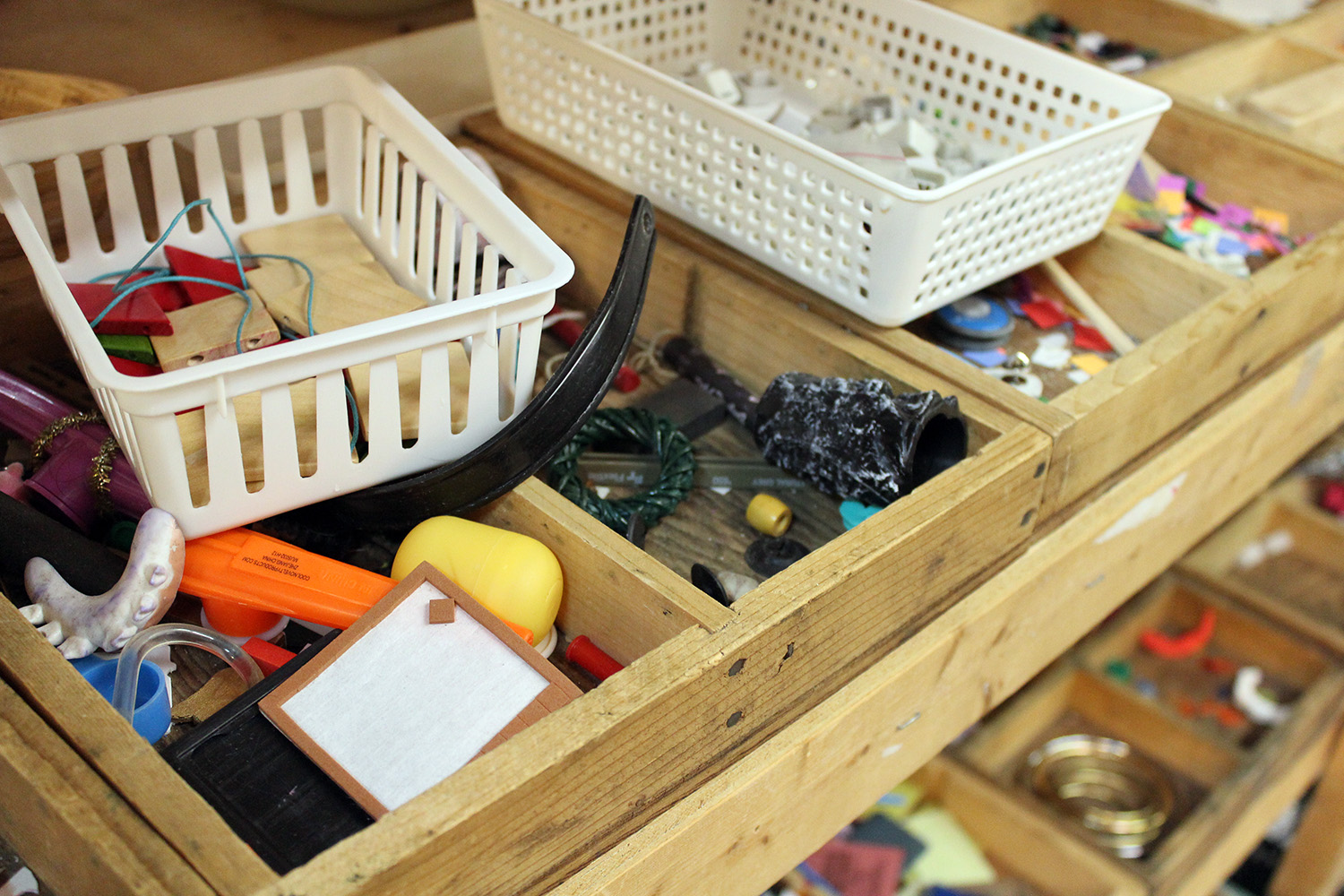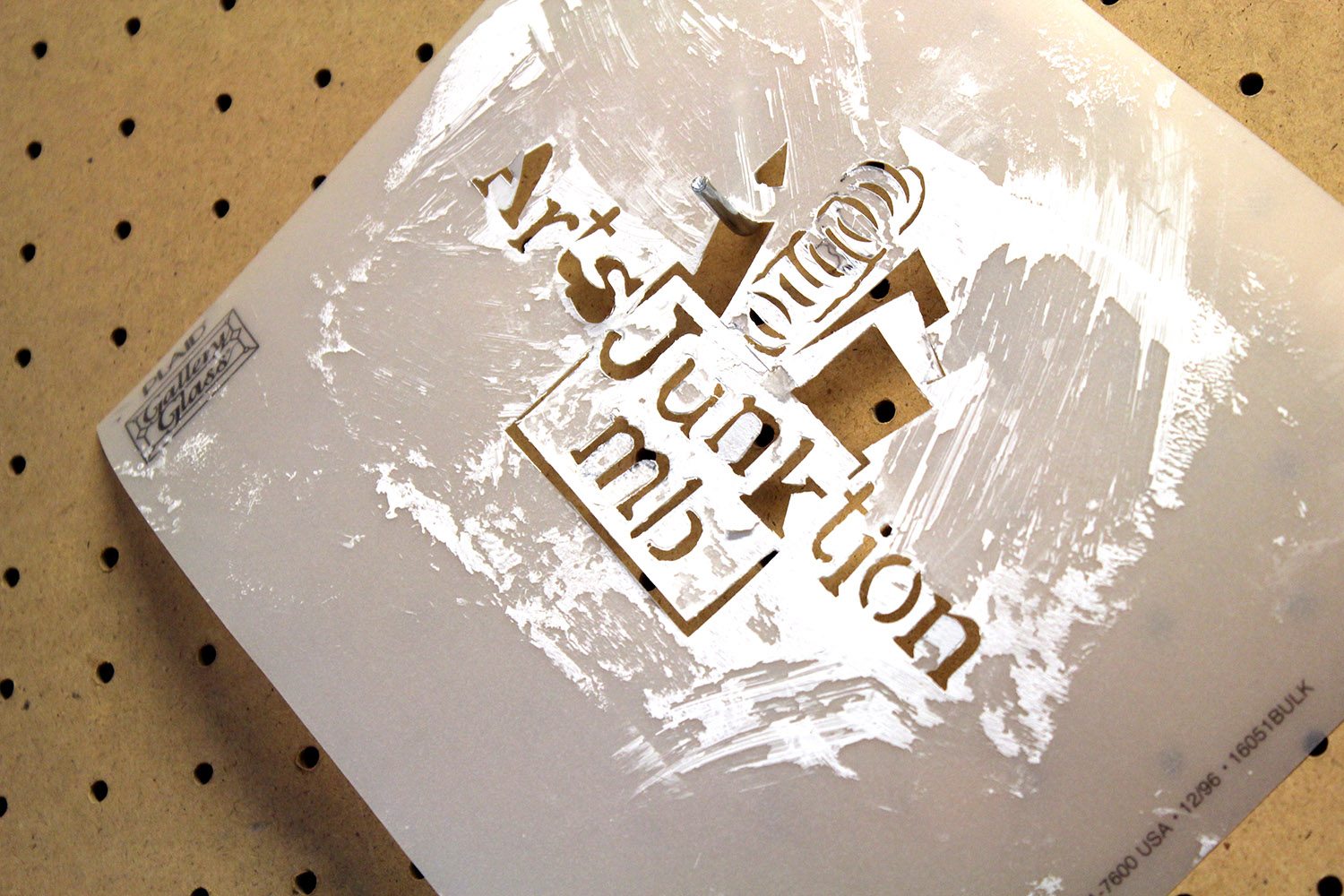



Rachael Poklitar
RACHAEL POKLITAR
Rachael Poklitar
RACHAEL POKLITAR
Rachael Poklitar believes in quality over quantity – especially when it comes to her wardrobe.
Rachael is the owner of Nettie + Min, an online vintage clothing shop named in homage to her grandma and baba – ladies who came from a time when the number of outfits hanging in their closets was much fewer than what you’d find in women's closets today.
Nettie + Min’s philosophy is that less is more. Women should love their wardrobes because they have clothes with character, garments that actually mean something to them – a feeling that can’t be replaced with the latest trend flitting through the mall.
“Your wardrobe can be ginormous, and you can still have nothing to wear,” Rachael says.
“It’s important to actually put some thought into what you’re buying.”
The kind of quality Rachael is looking for doesn’t come from high-priced or designer items. It comes from taking time to assess what she really needs or will use.
“I started thrifting when I was in high school,” Rachael says.
“It’s more interesting. I love the style of vintage, and I think the fact it’s lasted this long says something about the quality of things made back then.”
Though she’s always had an interest in mixing old with new in her wardrobe, Rachael’s buying habits took a pivotal turn after she completed a ten-month challenge to not buy anything new. She relied solely on thrift stores and second-hand items.
“It made me realize I don’t want to shop at the big chain stores you find in the mall," she says.
"When you walk into most stores it’s such a barrage of trendy things – there’s so much to look at, it’s overwhelming. You can walk out with ten things but when you go home you don’t actually care about any of those items – you just have ten more things hanging in your closet."
“Now, when I go into those shops, I’m disgusted. It’s just a warehouse filled with stuff made for a dime a dozen. There’s so much, it grosses me out."
Mixing thrift into her wardrobe and being more thoughtful about purchases doesn’t mean Rachael doesn't still enjoy buying new items. She promotes buying local, knowing the face of the person you’re buying from, and slowing down the buying process as a whole.
“I think people should care more about the person behind the product, not just because so much clothing is made in sweatshops – though you should care about that too – but also to know that a person is benefitting from your purchase. It’s going back to someone you know. You can see their face, it’s not some corporation.”
This buyer-seller connection is part of the reason why Rachael would eventually like to move off the web and focus on a brick-and-mortar shop here in Winnipeg.
“I think people like going to stores to actually try things on and talk to people, rather than that purchase just being a click.”
Rachael currently houses her products in a studio space at Frame Arts Warehouse. Though it doesn’t lend itself easily to foot traffic, occasionally her and other local vintage sellers, The Vintage Saint and Third Sister Vintage, will host sales at the space. She’s also considering taking part in First Fridays, a monthly event where artists in the Exchange District open up their studios to the public
“I think things are starting to shift. A lot more people are getting into thrifting. I'm often asked where I find my items, but not everyone wants to go through the effort of looking, so I’m finding it, cleaning it and displaying it for them.”
Rachael thinks the effort is well worth it when the clothes she finds get passed on to someone new, even if it requires some patience.
“If I find something really cool, I want someone to have it and love it. I recently sold a sweater that had been in the shop for three years. It’s a bit strange that it’s gone, that someone finally acknowledged a shirt I really loved. It makes me happy.”
“It means more, I think, finding things that have already been owned and have some history to them, I think that’s what it’s all about. I just want people to love what they own again.”

ArtsJunktion
ARTSJUNKTION
ArtsJunktion
ARTSJUNKTION
ArtsJunktion is a starving artist's best friend.
Located behind local art supply shop cre8ive supplies & services in the Exchange District, ArtsJunktion is a volunteer-run charitable organization that collects reusable materials and manufacturers’ waste. The junk they accumulate is offered back to the creative community as a free resource for artists.
“The idea is that the things donors bring in are all raw material for art,” says Andrea Bell Stuart, ArtsJunktion co-chair.
Andrea and her co-chair Melanie Janzen were inspired when they visited a similar resource in Toronto.
“We’re both teachers so we had March break off and we went to visit a place called ArtsJunktion in Toronto, which was affiliated with the schools and only teachers could use it,” says Andrea.
“We came back and thought, wouldn’t it be great to have a place like that here and anybody could use it?”
ArtsJunktion opened its doors seven years ago and the junk has been flowing ever since. Everything in the warehouse is donated – either by businesses, artists, or regular people with quality junk.
“Sometimes artists retire from their studios downtown,” Andrea says.
“They keep a bit of their stuff but get rid of everything else. It’s nice to know there’s a place like this they can give their stuff to and know it’s going to support other artists. They don’t need to throw anything out.”
The space provides a transitional home for used art supplies, but also raw materials and scraps that would otherwise be sent to the landfill. Anyone is welcome to drop in during the depot’s open hours to browse through the junk and take home whatever supplies they need at no charge.
“We get random junk and different materials, wood and cork and plastics and metal. Some of it’s new, some of it’s used, and some stuff you’d never even be able to buy at the store,” Andrea says.
As educators, Andrea and Melanie support teaching students about environmental stewardship through art. They see ArtsJunktion as a resource for teachers who are required to integrate sustainability into their curriculum.
“What was happening in schools before we arrived was, the parent of a child might have some leftover items they know would be great for art, so they drop it off at the school, but it would go into storage and nobody would ever use it. Eventually the custodian gets fed up with it and it gets thrown in the garbage, or it’s there for 20 years and isn’t touched.”
“ArtsJunktion was a way to start circulating what’s already out there.”
The space also has a classroom and offers a variety of workshops hosted by local artists. Unlike run-of-the-mill painting or craft classes, ingenuity is key during these presentations and creative use of unlikely objects is promoted.
“None of the workshops would ever suggest using all the same materials or doing all the same end products,” Andrea says.
ArtsJunktion currently has over 1500 members, and is continuing to grow. At the front door, there’s a guestbook where members are asked to sign in and later declare what they take with them when they leave.
“A lot of people are starting to find out about us and are spreading the word,” Andrea says.
“Membership is free, though we are hesitant to use that word because we always appreciate a donation to help pay the rent.”
ArtsJunktion is also part of First Fridays, a monthly event where artists in the Exchange District open up their studios to the public.
Whether you're just starting out and don't have the funds to pursue your artistic side, or you're a seasoned artist with a knack for working with reclaimed materials, ArtsJunktion can be the perfect place for inspiration. You never know what gems you might find among the junk!
Hours:
Tuesday - Thursday 1:00 a.m. - 5:00 p.m.
Saturday 12:00 p.m. - 4:00 p.m.
Address:
312 B William Ave.
(East Side, Loading Dock Entrance)
Winnipeg, Manitoba, Canada
R3A 1P9

Food Matters Panel
THE FUTURE OF FOOD
IN WINNIPEG
Food Matters Panel
THE FUTURE OF FOOD
IN WINNIPEG
On February 10, Food Matters Manitoba brought together a restaurateur, a medical doctor, a landscape architect, and an anthropology professor to discuss the future of food in our city. The aim was to start a conversation and motivate attendees to look beyond their plates to consider the value, security, and sustainability of our food.
More than just the calories, carbs and proteins that fuel our bodies each day, food is a social connecting point, a cultural foundation, and an artistic expression. It manifests in nearly every aspect of our lives, affecting how we live, work and play. We can’t live without it and yet as a society we’re gradually becoming disconnected from it.
Each an expert in their field, panelists were asked to give their opinion on topics related to our food and what can be done to ensure a healthy future.
Take a look at the highlights below for an overview of the topics discussed. Note that panelists' talking points have been paraphrased and condensed for clarity.
How is Winnipeg doing when it comes to issues of food, what are the good things and what are we doing wrong?
Talia
The Good:
People are being more thoughtful when thinking about their food. The number of independently owned restaurants is growing, and people are getting to eat more intentional foods.
There are people putting a massive amount of thought, effort and money into producing products that are good for you and delicious and the opposite of factory farms, that, ideally you would want to feed your family.
The Bad:
Owners of small family farms are constantly running uphill. There are still licensing issues creating challenges for many farmers, preventing people from accessing their products.
Paul
The Good:
There have been a lot of positive strides in the healthcare system and we’re seeing a trend towards care teams that include nutritionists and dieticians. There is a stronger focus on holistic healing in the healthcare system. From a research perspective, we have a rich source of public health data, allowing us to make informed decisions and evaluate public health.
The Bad:
We need to develop more primary care networks. The model of having one general physician is problematic. There’s no way one physician can do all those jobs.
There are a lot of strong, entrenched opinions regarding what’s healthy and what’s not, but there isn’t a one-size-fits-all strategy.
There is a prevalence of diabetes and dialysis in our province, which is expensive on the healthcare system and could be preventable with the right resources and preventative measures.
We still have a lot of work to do on the clinical side as far as incorporating nutritionists.
Bob
The Good:
There’s a lot of creativity in the food service industry and the food creation industry. We’re starting to get a really creative generation that’s moving in and moving things forward. The fact that there’s a restaurant in the middle of the Red River right now alone is mind-boggling, it activates a space that is typically ‘dead’ even in the summer months.
Initiatives like CitiGrow are developing urban agriculture sites and activating landscapes, such as at The Forks where the produce grown is sold back to Inn at the Forks and they use it in the food they make – we have a lot of great things happening at that level.
The Bad:
Often we’re waiting for something to happen to help others. As a city, we rely on volunteers to take initiative, and sometimes the City needs to step forward and support initiatives that could turn unused land into productive pieces of land.
Jaime
The Good:
Within the city, Neechi Commons is helping connect communities to their food and support indigenous food sovereignty.
The Bad:
Rather than getting stuck in the quagmire of food security or food insecurity we need to do something more meaningful, such as highlighting the connection between food and culture.
What are some of the things that you would like to see us do in Winnipeg especially?
Talia
We need to look at some of the rules and regulations that are creating barriers for small farmers and preventing them from connecting to restaurants and the public. The people instilling the rules and regulations aren’t always as knowledgeable as they could be in specific areas
Paul
There are very generic things out there that we can do on a policy level. I’d like to see recommendations around things like carb intake and sodium intake. We need to do what we can to prevent downstream complications like dialysis.
Give people access to resources so that they can make choices because they’re practical, not because they are forced to.
Bob
Until we have someone who’s actively engaged within the city administration it’s going to be tough to move things forward.
To talk about lacking a large grocery store as a reason why we don’t have people living downtown is an excuse. We have resources available like Young’s Market or Foodfare, but we’re used to living in a society that goes to Costco once a month, so it’s a bit of a lifestyle shift and a mind shift.
Until the city buys into things we’re going to be relying on volunteers. Volunteers are great and we should use them, but we need policies to support effective changes.
How do we strengthen the link between indigenous people and food?
Jaime
The first thing is the issue of access. The next step is engagement.
A lot of the time indigenous people have access to cultural food, but they don’t know what to do with it. Urban indigenous people have become de-skilled, so we’re trying to up-skill them.
Cooking classes alone don’t work; it has to be more meaningful. If there’s a cultural intention behind preparing food it gives people more sovereignty over what they’re putting in their mouths.
Participants felt that their consciousness had shifted; they felt connected to their food in a way they never had been before.
Is there something small and practical, a first step on the city side that we can do right now to start this process?
Talia
It comes down to education. There’s so much misinformation about food. Information is coming from so many different places that people get confused. We need to cut through that.
Bob
Education is the biggest thing. There are a lot of things we can do at the school level, like integrating food into the curriculum so it’s not just about sports and learning, it’s about healthy living and active lifestyles.
Jaime
There’s an intergenerational gap for knowledge transmission. We need to recognize that our older generations have a great deal of knowledge that often our kids are losing out on.
The Restaurateur – Talia Syrie
Talia is the owner of The Tallest Poppy, a newly relocated Winnipeg diner that focuses on sustainable, intentional foods. Previously, she assisted with the start up of Neechi Commons Come ‘N Eat Café.
The Doctor – Paul Komeda
Paul is the Director of Research at Seven Oaks General Hospital. He specializes in nephrology – kidney function – and is Medical Director of the home hemodialysis program at Seven Oaks. He’s also an assistant professor of medicine at the University of Manitoba.
The Architect – Bob Somers
Bob is a landscape architect with Scatliff + Miller + Murray, an urban design company based here in Winnipeg. The company focuses on revitalizing urban areas through sustainable development, including native plant revegetation.
The Professor – Jaime Cidro
Jaime is an assistant professor in the Anthropology Department at The University of Winnipeg. She specializes in indigenous health issues and accessing traditional foods in urban areas. She is also the Associate Director of the Urban Aboriginal Knowledge Network Prairie Research Centre and has led several projects on inner city food security in Winnipeg.



